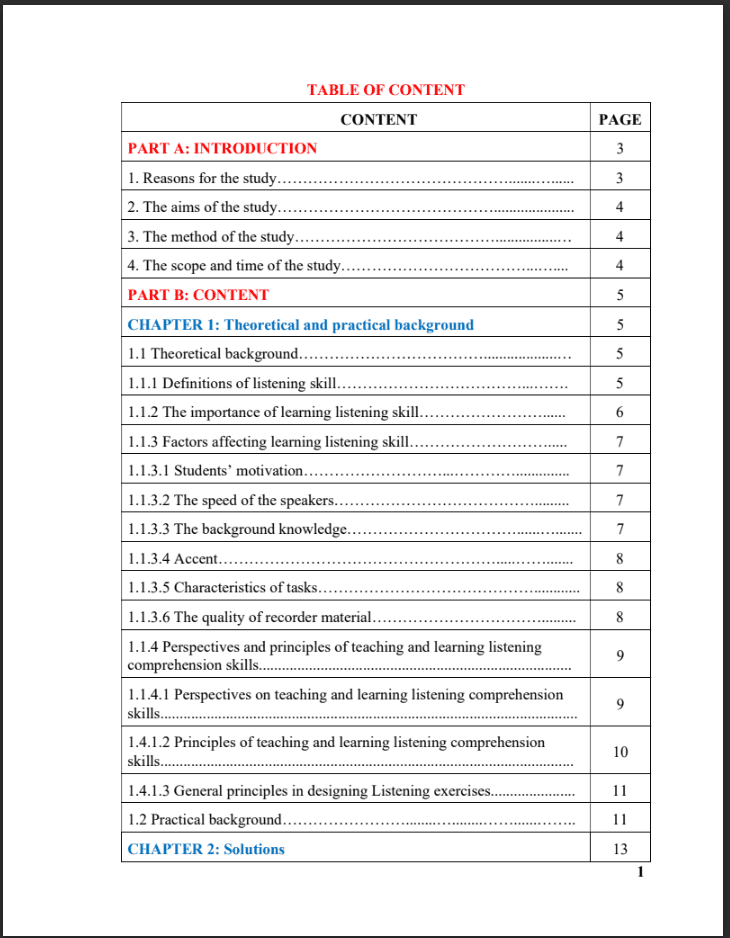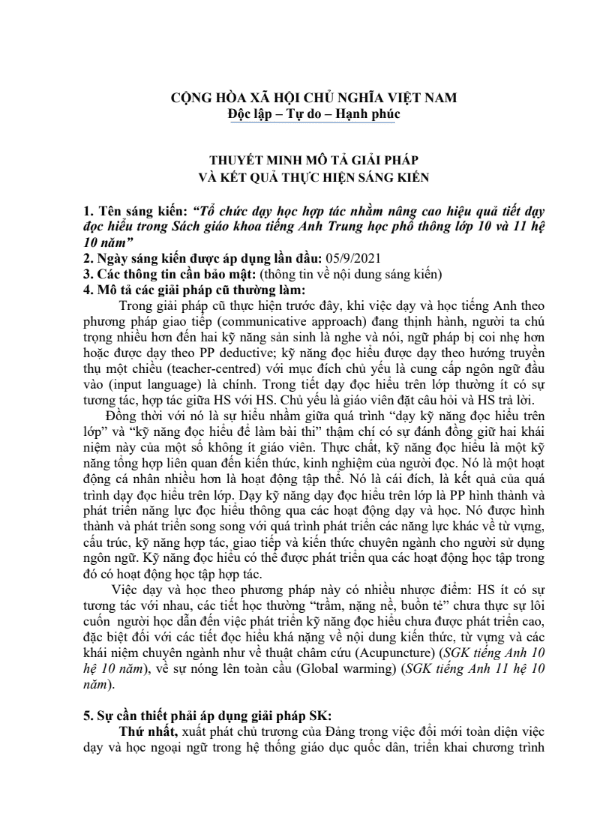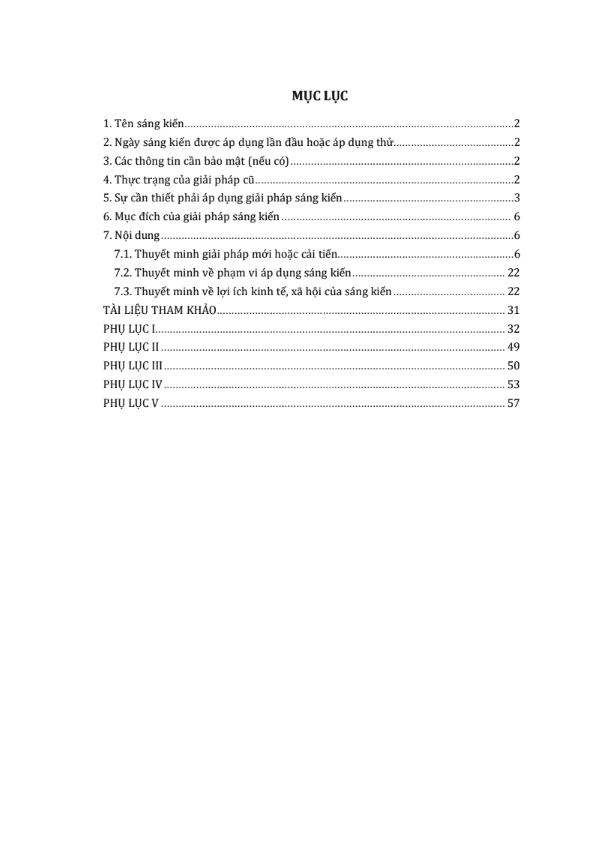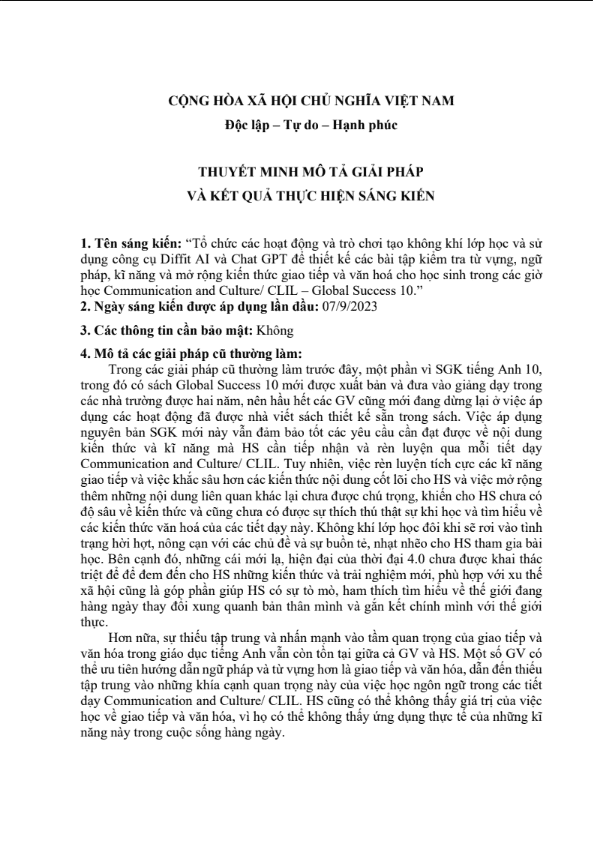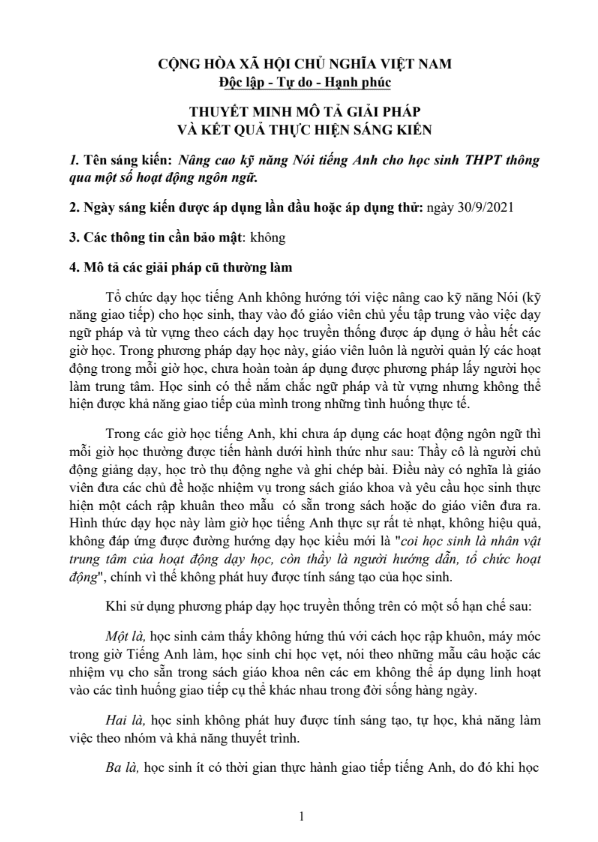SKKN Improve listening skills for weak students by redesigning some tasks in the while listening part – English 11 (pilot program) in the direction of the Department’s test approach
- Mã tài liệu: MP0104 Copy
| Môn: | Tiếng Anh |
| Lớp: | 11 |
| Bộ sách: | |
| Lượt xem: | 475 |
| Lượt tải: | 4 |
| Số trang: | |
| Tác giả: | Bùi Thị Thu Lan |
| Trình độ chuyên môn: | Cử nhân đại học |
| Đơn vị công tác: | THPT Yên Thành |
| Năm viết: | 2022-2023 |
| Số trang: | |
| Tác giả: | Bùi Thị Thu Lan |
| Trình độ chuyên môn: | Cử nhân đại học |
| Đơn vị công tác: | THPT Yên Thành |
| Năm viết: | 2022-2023 |
Sáng kiến kinh nghiệm “Improve listening skills for weak students by redesigning some tasks in the while listening part – English 11 (pilot program) in the direction of the Department’s test approach”triển khai gồm các biện pháp nổi bật sau:
Mô tả sản phẩm
PART A: INTRODUCTION
- REASON FOR THE STUDY
Learning English Language is considered as an important aspect at every stage of educational process. Enhancing the quality of education in general and the quality of English subject in particular is one of the top concerns of the current education. When English is known as a universal language of the world, people can use it as their second language.
Of the four English language skills – Listening, Speaking, Reading and Writing, Listening is supposed to be the most difficult due to the complex and the ability of keep up the speed of listening comprehension in second language. For many students, learning listening skill likes a nightmare. Most of the children have depression, fear and sleepiness when studying listening. As a result, when taking the test, they did the listening part by choosing the big answer or “beating luck”. Leads to the results of the listening section, as well as the overall score is not high.
After a period of teaching in Yen Thanh 3 high school, I found that there are two objective reasons leading to the above situation as follows:
+ Firstly, Yen Thanh 3 School is located in a mountainous area with special difficulties and low quality of life. Therefore, the conditions for children to come into contact with modern technology are almost very difficult. They don’t have time and tools to practice at home
+ Secondly, the tasks in the English textbook are designed for the while listening skills part that is too difficult and not really suitable for the level of students in the area, as well as the semester exam structure of the Department.
🕮 Exercises in the textbook include the following format:
- Listen and decide whether statements are true or false (Unit 1, 5, 7, 9)
- Listen and choose the best option (Unit 1, 2, 6. 7)
- Listen and note down the ideas in the table (Unit 5, 7)
- Listen and fill in the gaps in the summary (Unit 9)
- Listen and answer the questions (Unit 2,3,6)
- Listen and fill in the missing information (Unit 4, 5, 8)
- Listen and number the pictures (Unit 10)
- Listen and match the information (Unit 3)
- Listen and tick the correct box (Unit 10)
However, the midterm and final term test in recent years of Nghe An Department of Education and Training has come out in two forms: “Listen and decide whether statements are true or false” and “Listen and choose the best option”. These are two forms of moderate difficulty. However, because of not having much time to practice at home as well as through listening lessons in class (due to the tasks are designed as analyzed), almost students do not get high results.
Faced with this situation, as an English teacher, I myself always ponder and think to find a solution to overcome the above situation. I find that the second objective reason is the reason that a teacher like me can help them overcome. That’s why I’m bolder and more enthusiastic about the topic “Improve listening skills for weak students by redesigning some tasks in the while listening part – English 11 (pilot program) in the direction of the Department’s test approach”
✍ The novelty of the initiative:
- Redesigning the listening exercises in the textbook to closely follow the test form of the Nghe An Department of Education and Training to help students have more time to practice with the regular test form of the Department. Thereby improving the quality of the subject.
- Redesigning the listening exercises in the textbook from easy to difficult to help all students in the class can participate in the listening lesson more actively and proactively. The types of exercises in the Listening lesson are redesigned to ensure the classification of students’ levels in order to help all students to be able to perform well in class. Thereby motivating both weak students and good students to study English better.
- THE AIMS OF THE STUDY
– The main purpose of this study is to work out some adapted activities for listening part instead of using original tasks in textbook, with the aim of attracting and motivating students in learning listening skill.
– Through the study, students can have another vision and change their attitude in learning listening skill. Especially the weak students can do the tasks which are suitable for their level
III. THE METHOD OF THE STUDY
– Draw from experience of my teaching
– Consult many documents and ask my colleagues about their teaching experiences
- THE SCOPE AND TIME OF THE STUDY
– Students in grade 11 (11A5,11A8) (make up the majority of weak students)
– Time: school year 2022-2023
PART B. CONTENT
CHAPTER 1: THEORETICAL AND PRACTICAL BACKGROUND
1.1 Theoretical background
1.1.1 Definitions of listening skill
The study of listening skill is one of the topics that many people are interested in. Therefore, it is not strange to have so many definitions of it.
According to Oxford Living Dictionaries, to listen is to give attention to sound or action.
Howatt and Dakin (1974) defined listening as the ability to identify and understand what others are saying. This involves understanding a speaker’s accent or pronunciation, his grammar and his vocabulary and grasping his meaning.
Hirsch (1986) gave another definition: “Listening as an aspect of skills: involves neurological response and interpretations of sounds to understand and to give meaning by reacting, selecting meaning, remembering, attending, analyzing and including previous experience”
Listening differs from obeying. A person who receives and understands information or an instruction, and then chooses not to comply with it or not to agree to it, has listened to the speaker, even though the result is not what the speaker wanted. Listening is a term in which the listener listens to the one who produced the sound to be listened.
A semiotician, Roland Barthes characterized the distinction between listening and hearing.” Hearing is a physiological phenomenon; listening is a psychological act.” We are always hearing, most of the time subconsciously. Listening is done by choice. It is the interpretative action taken by someone in order to understand and potentially make meaning of something they hear
According to Roland Barthes, listening can be understood on three levels: alerting, deciphering, and an understanding of how the sound is produced and how the sound affects the listener.
Alerting, being the first level is the detection of environmental sound cues. This means that certain places have certain sounds associated with them. This is the best explained using the example of someone’s home. Their home has certain sounds associated with it that makes it familiar and comfortable. An intrusion, a sound that is not familiar (e.g. a squeaking door or floorboard, a breaking window) alerts the dweller of the home to the potential danger.
Deciphering, the second level, describes detecting patterns when interpreting sounds. An example of this level is that of a child waiting for the sound of his mother’s return home. In this scenario the child is waiting to pick up on sound cues (e.g. jingling keys, the turn of the doorknob, etc.) that will mark his mother’s approach.
Understanding, the third level of listening, means knowing how what one says will affect another. This sort of listening is important in psychoanalysis , the study of the unconscious mind. Barthes states that the psychoanalyst must turn off their judgment while listening to their patient in order to communicate with their patient’s unconscious in an unbiased fashion. This is the same way that listeners must turn off their judgment when listening to other.
All of the three levels of listening function within the same plane, and sometimes all at once. Specifically, the second and third levels, which overlap vastly, can be intertwined in that obtaining, understanding and deriving meaning are part of the same process. In that the child, upon hearing the doorknob turn (obtaining), can almost automatically assume that someone is at the door (deriving meaning).
1.1.2 The importance of learning listening skill
Learning English or any language, the ability to listen is extremely important. As a newborn baby, to learn how to speak he must listen to a lot of what others convey. Through the listening process, you will gain more vocabulary, sentence structures and identify standard sounds.
When we can neither write and read nor speak, we can still use physical language to communicate. But if we cannot listen what others say it means the communication has failed. Moreover, we cannot develop speaking skill unless we also develop listening skill. To have a successful conversation, students must understand what is said to them. Later, the ability to understand spoken English may become very important (for listening to the radio, understanding foreign visitors, studying…). To develop this ability, students need plenty of practice in listening to English spoken at normal speed. Without listening, the man becomes backward in each minute of their lives. Listening to spoken English is an important way of acquiring the language – of “picking up” structures and vocabulary. Therefore, it is understandable why listening skill ranks the first among the four language skills.
As an integrative skill, listening plays an important role in the process of language learning or acquisition and facilitating the emergence of other language skill. According to Nord (1980, p.17), listening is the way of learning the language. “It gives the learner information from which to build up the knowledge necessary for using the language. When this knowledge is built up, the learner can begin to speak. The listening-only period is a time of observation and learning which provides the basis for the other language skills” (Nation, 1990, p.12). Most learners will spend more time listening to the foreign language than producing it themselves. Failing to understand spoken language, people may miss important information presented to them or respond in a funny way. So training in listening is really necessary. It helps students make the transition from classroom English to the real-life English more easily and effectively.
Cheung, Y. K. (2010) discussed the importance of listening comprehension in learning English as a foreign language and argues that more emphasis should be given to listening comprehension in his study. His study cited significant research findings in SLA and reviewed the relationship between listening comprehension and language learning suggesting that listening is prerequisite to other skills and it should be the primary skill to be acquired in language learning.
TÀI LIỆU LIÊN QUAN
- 7
- 105
- 1
- [product_views]
- 5
- 173
- 2
- [product_views]
- 4
- 165
- 3
- [product_views]
- 4
- 129
- 4
- [product_views]
100.000 ₫
- 6
- 434
- 5
- [product_views]
100.000 ₫
- 2
- 507
- 6
- [product_views]
100.000 ₫
- 9
- 546
- 7
- [product_views]
100.000 ₫
- 4
- 409
- 8
- [product_views]
100.000 ₫
- 2
- 595
- 9
- [product_views]
100.000 ₫
- 0
- 538
- 10
- [product_views]

